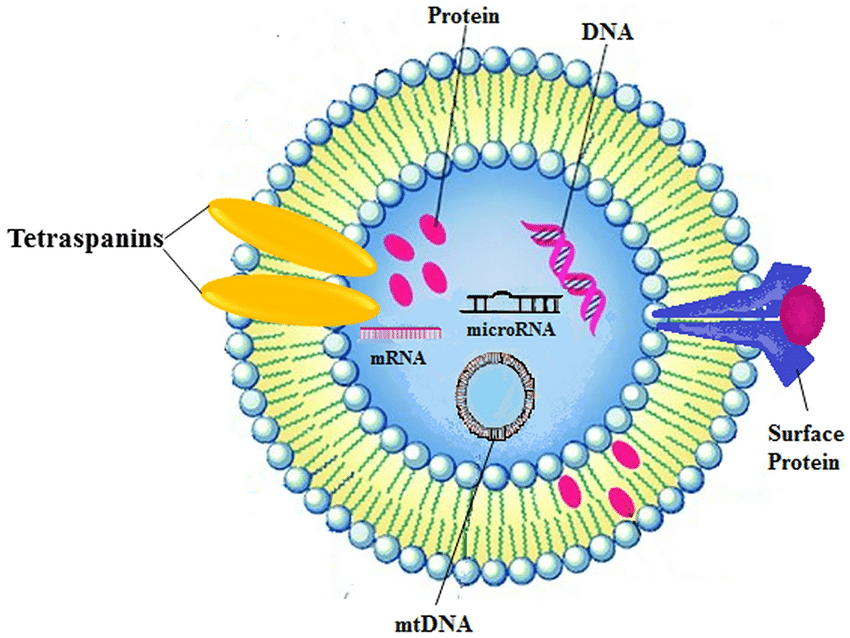Blog Post
Unlocking the Therapeutic Potential of Exosomes in Disease Treatment
Introduction:
Exosomes, tiny membrane-bound vesicles secreted by various cells, have emerged as promising therapeutic agents in the field of regenerative medicine. These minuscule carriers play a crucial role in intercellular communication, shuttling bioactive molecules between cells and influencing physiological processes. In this blog post, we’ll delve into the fascinating world of exosomes and explore their potential applications in treating various diseases.
The Versatility of Exosomes:
Exosomes are loaded with a cargo of proteins, lipids, and nucleic acids, making them versatile messengers in the body. This inherent diversity allows exosomes to participate in a myriad of cellular functions and opens the door to innovative therapeutic strategies. From immune modulation to tissue repair, the adaptability of exosomes positions them as powerful tools for targeted disease intervention.
Exosomes and Immune Modulation:
One of the most exciting aspects of exosome research is their role in immune modulation. Exosomes derived from immune cells can carry signals that either enhance or suppress immune responses, offering a finely tuned approach to managing immune-related disorders. The ability to harness exosomes for immunotherapy holds immense potential in conditions such as autoimmune diseases and inflammatory disorders.
How Exosome Modulate the Immune System
- Transfer of Bioactive Molecules: Exosomes carry a cargo of bioactive molecules, including proteins, lipids, and nucleic acids (such as RNA and microRNA). When released by donor cells, these exosomes can be taken up by recipient immune cells, transferring their cargo and influencing the molecular and genetic landscape of the recipient cells.
- Antigen Presentation: Antigen-presenting cells (APCs), such as dendritic cells, use exosomes to present antigens to other immune cells. Exosomes derived from APCs contain major histocompatibility complex (MHC) molecules loaded with antigens. This presentation helps activate T cells and initiate immune responses.
- Immunomodulatory Proteins: Exosomes harbor various immunomodulatory proteins that can either enhance or suppress immune responses. For example, they may carry cytokines, which are signaling proteins that regulate immune cell behavior. By delivering these proteins, exosomes can influence the activity and function of recipient immune cells.
- Tolerance Induction: Exosomes contribute to immune tolerance by promoting regulatory T cell (Treg) responses. Tregs play a crucial role in dampening excessive immune reactions and maintaining immune homeostasis. Exosomes derived from Tregs contain molecules that foster an immunosuppressive environment, contributing to the prevention of autoimmune responses.
- Communication in Inflammatory Microenvironments: In conditions of inflammation, cells release exosomes with specific cargo designed to modulate the inflammatory response. Exosomes may carry anti-inflammatory signals to counteract excessive inflammation or, conversely, pro-inflammatory signals to amplify immune reactions against pathogens or cancer cells.
- Role in Cellular Crosstalk: Exosomes facilitate crosstalk between different immune cell types. For instance, exosomes released by one immune cell type may affect the behavior of another cell type by delivering signals that modify their activity. This interconnected communication is essential for coordinating immune responses.
- Apoptotic Cell Clearance: Exosomes participate in the clearance of apoptotic cells and cellular debris. This process is crucial for maintaining tissue homeostasis and preventing the release of inflammatory signals from dying cells.
Targeting Neurological Disorders:
In the realm of neuroscience, exosomes have demonstrated the ability to traverse the blood-brain barrier, offering a unique delivery system for therapeutic cargo to the central nervous system. Researchers are exploring exosome-based treatments for neurodegenerative diseases, such as Alzheimer’s and Parkinson’s, with the goal of slowing or even reversing disease progression.
Cardiovascular Applications:
Exosomes derived from cardiac cells are being investigated for their regenerative potential in cardiovascular diseases. These tiny vesicles may contribute to tissue repair, angiogenesis, and overall cardiac function, offering new avenues for treating conditions like heart failure and ischemic heart disease.
Exosomes in Cancer Therapy:
The role of exosomes in cancer is complex, with both tumor-promoting and tumor-suppressing functions. Researchers are exploring ways to manipulate exosomes to enhance cancer immunotherapy, deliver therapeutic agents directly to cancer cells, and monitor disease progression through liquid biopsies.
Conclusion:
As research on exosomes advances, so does our understanding of their potential therapeutic applications. From immune modulation to targeted delivery of therapeutic cargo, exosomes represent a cutting-edge frontier in the quest for novel and effective disease treatments. Stay tuned as scientists unravel more mysteries surrounding these tiny yet powerful vesicles, paving the way for a new era in personalized medicine.


